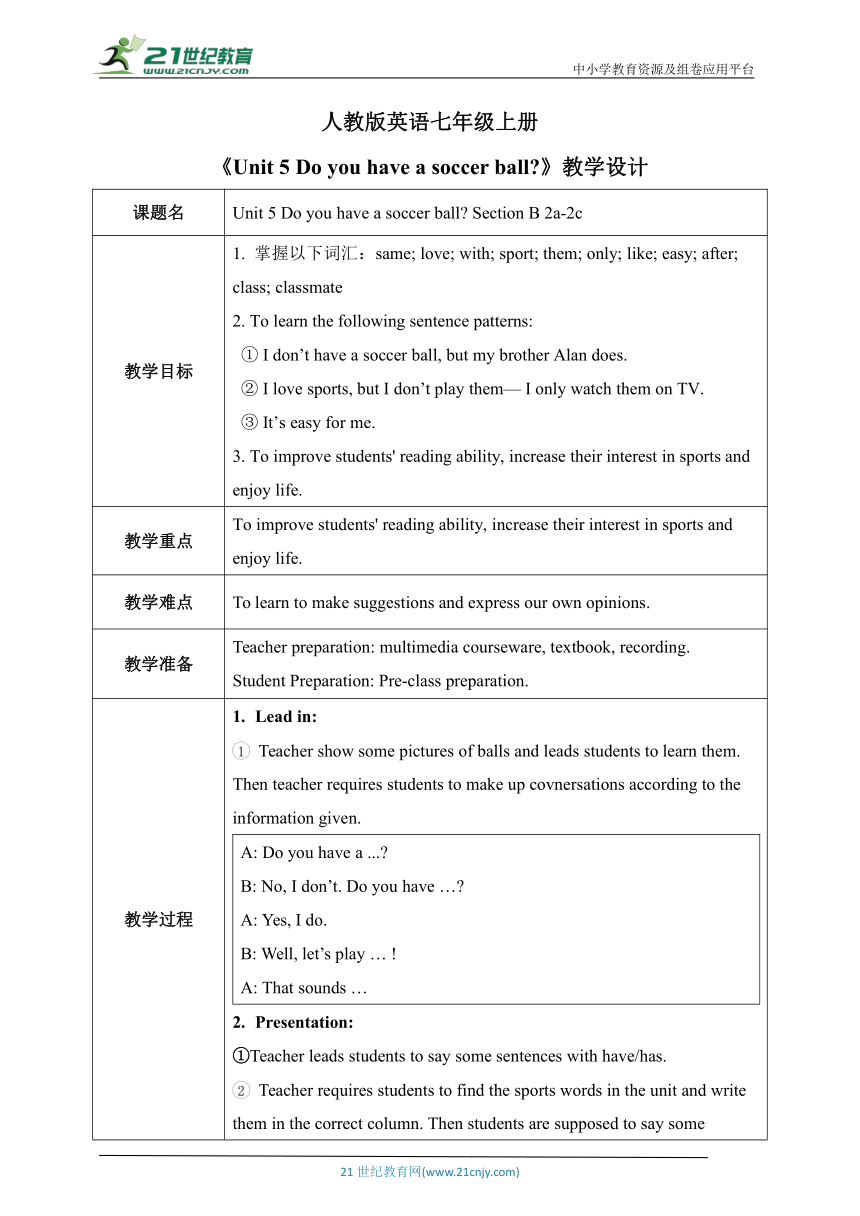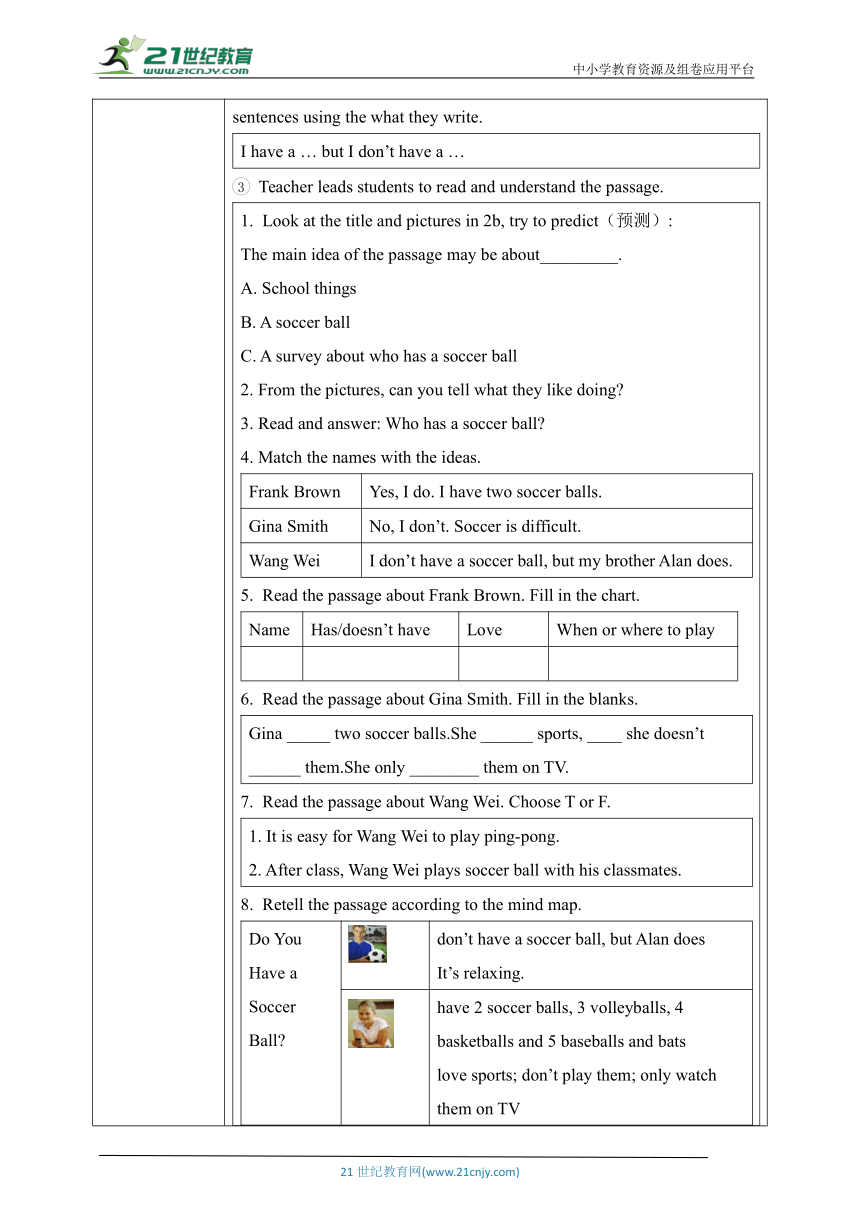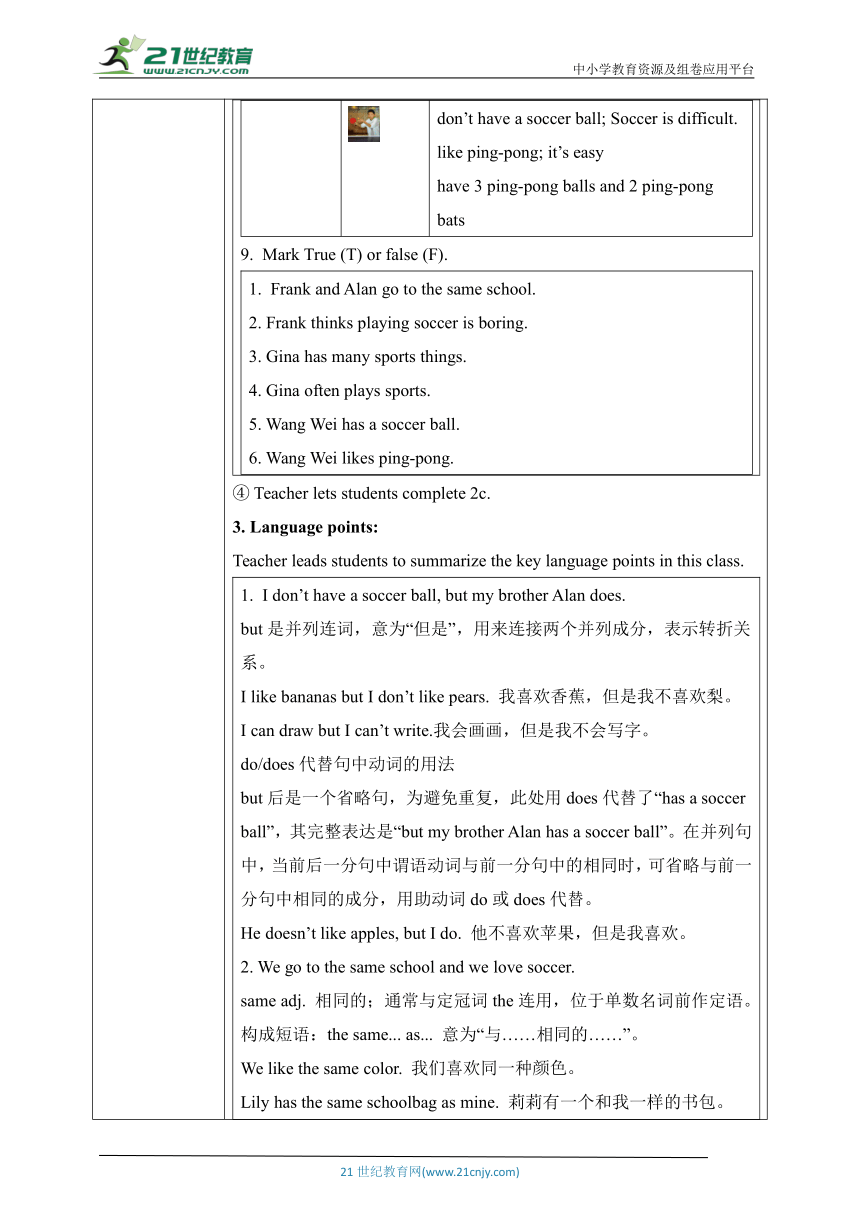(新课标)Unit 5 Do you have a soccer ball Section B 2a-2c教学设计
文档属性
| 名称 | (新课标)Unit 5 Do you have a soccer ball Section B 2a-2c教学设计 |

|
|
| 格式 | zip | ||
| 文件大小 | 1.3MB | ||
| 资源类型 | 试卷 | ||
| 版本资源 | 人教新目标(Go for it)版 | ||
| 科目 | 英语 | ||
| 更新时间 | 2022-08-23 00:00:00 | ||
图片预览



文档简介
中小学教育资源及组卷应用平台
人教版英语七年级上册
《Unit 5 Do you have a soccer ball 》教学设计
课题名 Unit 5 Do you have a soccer ball Section B 2a-2c
教学目标 掌握以下词汇:same; love; with; sport; them; only; like; easy; after; class; classmate
2. To learn the following sentence patterns: ① I don’t have a soccer ball, but my brother Alan does. ② I love sports, but I don’t play them— I only watch them on TV. ③ It’s easy for me.3. To improve students' reading ability, increase their interest in sports and enjoy life.
教学重点 To improve students' reading ability, increase their interest in sports and enjoy life.
教学难点 To learn to make suggestions and express our own opinions.
教学准备 Teacher preparation: multimedia courseware, textbook, recording.Student Preparation: Pre-class preparation.
教学过程 Lead in:Teacher show some pictures of balls and leads students to learn them. Then teacher requires students to make up covnersations according to the information given. A: Do you have a ... B: No, I don’t. Do you have … A: Yes, I do.B: Well, let’s play … !A: That sounds …Presentation:①Teacher leads students to say some sentences with have/has. Teacher requires students to find the sports words in the unit and write them in the correct column. Then students are supposed to say some sentences using the what they write.I have a … but I don’t have a …Teacher leads students to read and understand the passage.Look at the title and pictures in 2b, try to predict(预测):The main idea of the passage may be about_________.A. School thingsB. A soccer ballC. A survey about who has a soccer ball2. From the pictures, can you tell what they like doing 3. Read and answer: Who has a soccer ball 4. Match the names with the ideas. Frank BrownYes, I do. I have two soccer balls.Gina SmithNo, I don’t. Soccer is difficult.Wang WeiI don’t have a soccer ball, but my brother Alan does.Read the passage about Frank Brown. Fill in the chart.NameHas/doesn’t haveLoveWhen or where to playRead the passage about Gina Smith. Fill in the blanks.Gina _____ two soccer balls.She ______ sports, ____ she doesn’t ______ them.She only ________ them on TV.Read the passage about Wang Wei. Choose T or F.1. It is easy for Wang Wei to play ping-pong.2. After class, Wang Wei plays soccer ball with his classmates.Retell the passage according to the mind map.Do You Have a Soccer Ball don’t have a soccer ball, but Alan doesIt’s relaxing. have 2 soccer balls, 3 volleyballs, 4 basketballs and 5 baseballs and batslove sports; don’t play them; only watch them on TVdon’t have a soccer ball; Soccer is difficult.like ping-pong; it’s easyhave 3 ping-pong balls and 2 ping-pong batsMark True (T) or false (F). Frank and Alan go to the same school.2. Frank thinks playing soccer is boring.3. Gina has many sports things.4. Gina often plays sports.5. Wang Wei has a soccer ball.6. Wang Wei likes ping-pong.④ Teacher lets students complete 2c.3. Language points:Teacher leads students to summarize the key language points in this class.I don’t have a soccer ball, but my brother Alan does. but是并列连词,意为“但是”,用来连接两个并列成分,表示转折关系。I like bananas but I don’t like pears. 我喜欢香蕉,但是我不喜欢梨。I can draw but I can’t write.我会画画,但是我不会写字。do/does代替句中动词的用法but后是一个省略句,为避免重复,此处用does代替了“has a soccer ball”,其完整表达是“but my brother Alan has a soccer ball”。在并列句中,当前后一分句中谓语动词与前一分句中的相同时,可省略与前一分句中相同的成分,用助动词do或does代替。He doesn’t like apples, but I do. 他不喜欢苹果,但是我喜欢。2. We go to the same school and we love soccer.same adj. 相同的;通常与定冠词the连用,位于单数名词前作定语。构成短语:the same... as... 意为“与……相同的……”。We like the same color. 我们喜欢同一种颜色。Lily has the same schoolbag as mine. 莉莉有一个和我一样的书包。same的反义词为different(不同的),后接名词时用复数形式。常构成短语:be different from... 意为“与……不同”。My sister and I are in different classes. 我和我妹妹在不同的班级。My pen is different from his. 我的钢笔与他的不同。3. love v. & n. 爱; 喜爱1) love在句中作动词,意为“爱; 喜爱”,近义词为like,但love感彩比like更强烈。其后接名词、代词、动词-ing或动词不定式作宾语。I love my family very much. 我很爱我的家人。love sth. 爱/喜爱某事、物He loves playing ping-pong. 他喜欢打乒乓球。love doing sth.爱/喜爱做某事He loves to read books after lunch. 他喜欢午饭后看书。love to do sth. 爱/喜爱做某事4. We play it at school with our friends. at school意为“在学校”,相当于in school。with prep. 和……在一起;带有; 使用1) 介词“和……在一起” I live with my parents. 我和我的父母住在一起。2) 介词“带有” He is a boy with glasses. 他是一个戴眼镜的男孩。3) 介词“使用” We see with our eyes. 我们用眼睛看东西。5. It is easy for me. 这对我来说挺容易的。 It's (It is )+adj.+for+sb. 表示“对某人来说,做某事怎样”e.g:It’s easy for me to learn English.对我来说,学英语很简单。“for + 具体的人” 表示“对……来说”。be动词后一般跟形容词。e.g:Reading is good for you, for him, for her—for all of us! 阅读对你、对他、还有她——对我们大家来说都有好处!4.Exercises:单项选择。1. I ________ TV at night (在晚上). A. look at B. see C. watch D. look2. Let’s ______ the map on the wall. A. look at B. see C. watch D. look3. —________ they have any ping-pong balls —Yes, they ________. A. Are; are B. Do;do C. Can; do D. Do; can4. The question is not easy. It’s very ____. A. difficult B. difficulty C. relaxing D. not difficult5. Let’s play _____ basketball. I don’t like playing _____ violin(小提琴) at home. A. the; the B. the;/ C. /; the D. /; /6. Let’s ____ and ____ football on the playground. A. to go; to play B. go; play C. to go; play D. go; to play
课后作业 1. Read the passage in 2b.2. Choose one paragraph in 2b and recite it.
21世纪教育网 www.21cnjy.com 精品试卷·第 2 页 (共 2 页)
HYPERLINK "http://www.21cnjy.com/" 21世纪教育网(www.21cnjy.com)
人教版英语七年级上册
《Unit 5 Do you have a soccer ball 》教学设计
课题名 Unit 5 Do you have a soccer ball Section B 2a-2c
教学目标 掌握以下词汇:same; love; with; sport; them; only; like; easy; after; class; classmate
2. To learn the following sentence patterns: ① I don’t have a soccer ball, but my brother Alan does. ② I love sports, but I don’t play them— I only watch them on TV. ③ It’s easy for me.3. To improve students' reading ability, increase their interest in sports and enjoy life.
教学重点 To improve students' reading ability, increase their interest in sports and enjoy life.
教学难点 To learn to make suggestions and express our own opinions.
教学准备 Teacher preparation: multimedia courseware, textbook, recording.Student Preparation: Pre-class preparation.
教学过程 Lead in:Teacher show some pictures of balls and leads students to learn them. Then teacher requires students to make up covnersations according to the information given. A: Do you have a ... B: No, I don’t. Do you have … A: Yes, I do.B: Well, let’s play … !A: That sounds …Presentation:①Teacher leads students to say some sentences with have/has. Teacher requires students to find the sports words in the unit and write them in the correct column. Then students are supposed to say some sentences using the what they write.I have a … but I don’t have a …Teacher leads students to read and understand the passage.Look at the title and pictures in 2b, try to predict(预测):The main idea of the passage may be about_________.A. School thingsB. A soccer ballC. A survey about who has a soccer ball2. From the pictures, can you tell what they like doing 3. Read and answer: Who has a soccer ball 4. Match the names with the ideas. Frank BrownYes, I do. I have two soccer balls.Gina SmithNo, I don’t. Soccer is difficult.Wang WeiI don’t have a soccer ball, but my brother Alan does.Read the passage about Frank Brown. Fill in the chart.NameHas/doesn’t haveLoveWhen or where to playRead the passage about Gina Smith. Fill in the blanks.Gina _____ two soccer balls.She ______ sports, ____ she doesn’t ______ them.She only ________ them on TV.Read the passage about Wang Wei. Choose T or F.1. It is easy for Wang Wei to play ping-pong.2. After class, Wang Wei plays soccer ball with his classmates.Retell the passage according to the mind map.Do You Have a Soccer Ball don’t have a soccer ball, but Alan doesIt’s relaxing. have 2 soccer balls, 3 volleyballs, 4 basketballs and 5 baseballs and batslove sports; don’t play them; only watch them on TVdon’t have a soccer ball; Soccer is difficult.like ping-pong; it’s easyhave 3 ping-pong balls and 2 ping-pong batsMark True (T) or false (F). Frank and Alan go to the same school.2. Frank thinks playing soccer is boring.3. Gina has many sports things.4. Gina often plays sports.5. Wang Wei has a soccer ball.6. Wang Wei likes ping-pong.④ Teacher lets students complete 2c.3. Language points:Teacher leads students to summarize the key language points in this class.I don’t have a soccer ball, but my brother Alan does. but是并列连词,意为“但是”,用来连接两个并列成分,表示转折关系。I like bananas but I don’t like pears. 我喜欢香蕉,但是我不喜欢梨。I can draw but I can’t write.我会画画,但是我不会写字。do/does代替句中动词的用法but后是一个省略句,为避免重复,此处用does代替了“has a soccer ball”,其完整表达是“but my brother Alan has a soccer ball”。在并列句中,当前后一分句中谓语动词与前一分句中的相同时,可省略与前一分句中相同的成分,用助动词do或does代替。He doesn’t like apples, but I do. 他不喜欢苹果,但是我喜欢。2. We go to the same school and we love soccer.same adj. 相同的;通常与定冠词the连用,位于单数名词前作定语。构成短语:the same... as... 意为“与……相同的……”。We like the same color. 我们喜欢同一种颜色。Lily has the same schoolbag as mine. 莉莉有一个和我一样的书包。same的反义词为different(不同的),后接名词时用复数形式。常构成短语:be different from... 意为“与……不同”。My sister and I are in different classes. 我和我妹妹在不同的班级。My pen is different from his. 我的钢笔与他的不同。3. love v. & n. 爱; 喜爱1) love在句中作动词,意为“爱; 喜爱”,近义词为like,但love感彩比like更强烈。其后接名词、代词、动词-ing或动词不定式作宾语。I love my family very much. 我很爱我的家人。love sth. 爱/喜爱某事、物He loves playing ping-pong. 他喜欢打乒乓球。love doing sth.爱/喜爱做某事He loves to read books after lunch. 他喜欢午饭后看书。love to do sth. 爱/喜爱做某事4. We play it at school with our friends. at school意为“在学校”,相当于in school。with prep. 和……在一起;带有; 使用1) 介词“和……在一起” I live with my parents. 我和我的父母住在一起。2) 介词“带有” He is a boy with glasses. 他是一个戴眼镜的男孩。3) 介词“使用” We see with our eyes. 我们用眼睛看东西。5. It is easy for me. 这对我来说挺容易的。 It's (It is )+adj.+for+sb. 表示“对某人来说,做某事怎样”e.g:It’s easy for me to learn English.对我来说,学英语很简单。“for + 具体的人” 表示“对……来说”。be动词后一般跟形容词。e.g:Reading is good for you, for him, for her—for all of us! 阅读对你、对他、还有她——对我们大家来说都有好处!4.Exercises:单项选择。1. I ________ TV at night (在晚上). A. look at B. see C. watch D. look2. Let’s ______ the map on the wall. A. look at B. see C. watch D. look3. —________ they have any ping-pong balls —Yes, they ________. A. Are; are B. Do;do C. Can; do D. Do; can4. The question is not easy. It’s very ____. A. difficult B. difficulty C. relaxing D. not difficult5. Let’s play _____ basketball. I don’t like playing _____ violin(小提琴) at home. A. the; the B. the;/ C. /; the D. /; /6. Let’s ____ and ____ football on the playground. A. to go; to play B. go; play C. to go; play D. go; to play
课后作业 1. Read the passage in 2b.2. Choose one paragraph in 2b and recite it.
21世纪教育网 www.21cnjy.com 精品试卷·第 2 页 (共 2 页)
HYPERLINK "http://www.21cnjy.com/" 21世纪教育网(www.21cnjy.com)
同课章节目录
- starters 预备篇(2012秋审查)
- Unit 1 Good morning !
- Unit 2 What’s this in English?
- Unit 3 What color is it ?
- Unit 1 My name's Gina.
- Section A
- Section B
- Unit 2 This is my sister.
- Section A
- Section B
- Unit 3 Is this your pencil?
- Section A
- Section B
- Unit 4 Where's my schoolbag?
- Section A
- Section B
- Unit 5 Do you have a soccer ball?
- Section A
- Section B
- Unit 6 Do you like bananas?
- Section A
- Section B
- Unit 7 How much are these socks?
- Section A
- Section B
- Unit 8 When is your birthday?
- Section A
- Section B
- Unit 9 My favorite subject is science.
- Section A
- Section B
